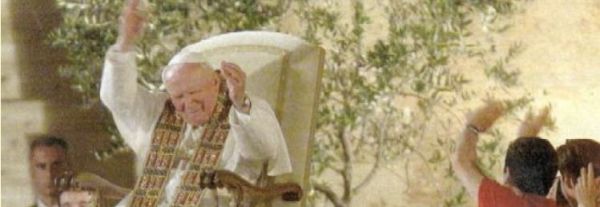1. "Ecclesia de Eucharistia vivit" - "The Church draws her life from the Eucharist". The Encyclical Letter on the Eucharist, which I signed last Holy Thursday during the Mass of the Lord's Supper, begins with these words. Today's Solemnity of "Corpus Christi" recalls that evocative celebration and at the same time makes us relive the intense atmosphere of the Last Supper.
"Take; this is my body... This is my blood" (Mk 14: 22-24). Let us listen again to Jesus' words while he offers his disciples the bread that has become his Body and the wine that has become his Blood. In this way he inaugurates the new paschal rite: the Eucharist is the sacrament of the new and eternal Covenant.
With those acts and words, Christ brings to fulfilment the long ordinances of the ancient rites, mentioned just now in the First Reading (cf. Ex 24: 3-8).
2. The Church returns constantly to the Upper Room as to the place of her birth. She returns to it because the Eucharistic gift establishes a mysterious "oneness in time" between the Passover of the Lord and the perennial making present of the paschal mystery in the world and in every generation (cf. Ecclesia de Eucharistia, n. 5).
This evening too, with deep gratitude to God, let us reflect in silence before the mystery of faith - mysterium fidei. Let us contemplate it with that profound feeling which, in the Encyclical, I called "Eucharistic amazement" (ibid., n. 6): immense and grateful wonder at the Sacrament in which Christ wanted "to concentrate" forever his entire mystery of love (cf. ibid., n. 5).
Let us contemplate the Eucharistic face of Christ, as did the Apostles and later, the saints of all the centuries. Let us contemplate him above all by learning at the school of Mary, "woman "of the Eucharist' in her whole life" (ibid., n. 53), the One who was "the first "tabernacle' in history" (ibid., n. 55).
3. This is the meaning of the beautiful tradition of Corpus Christi which is renewed this evening. With it, the Church that is in Rome also shows her constitutive link with the Eucharist, and professes joyfully that she "draws her life from the Eucharist".
Her Bishop, the Successor of Peter, and his Brothers in the Episcopate and in the Priesthood also draw their life from the Eucharist; men and women Religious, consecrated lay people and the baptized all draw their life from the Eucharist.
Christian families in particular, to whom a few days ago the Diocesan Ecclesial Convention was dedicated, draw their life from the Eucharist. Dear families of Rome! May the living presence of Christ in the Eucharist foster the grace of marriage in you and allow you to progress on the path of conjugal and family holiness.Draw from this wellspring the secret of your unity and love, imitating the example of the Blessed husband and wife, Luigi and Maria Beltrame Quattrochi, who began their days by partaking in the Eucharistic Banquet.
4. After Holy Mass, we will set out praying and singing for the Basilica of St Mary Major. With this procession we want to express symbolically our existence as pilgrims, "viatores", bound for the heavenly homeland.
We are not alone on our pilgrimage: Christ, the Bread of life, walks with us: "panis angelorum, factus cibus viatorum" - "Lo the angel's food is given to the pilgrim..." (Sequence).
May Jesus, the spiritual food that nourishes the hope of believers, sustain us on this journey towards Heaven and strengthen our communion with the heavenly Church.
The Most Holy Eucharist, a glimpse of Heaven appearing on earth, pierces the clouds of our history. A glorious ray of the heavenly Jerusalem, it lights up our journey (cf. Ecclesia de Eucharistia, n. 19).
5. "Ave verum corpus natum de Maria Virgine": Hail, true Body of Christ, born of the Virgin Mary!
The soul melts into wonder and adoration before so sublime a Mystery.
"Vere passum, immolatum in cruce pro homine". From your death on the Cross, O Lord, flows life for us which never dies.
"Esto nobis praegustatum mortis in examine". O Lord, obtain that each one of us, nourished by you, may face all of life's trials with confident hope, until the day when you will be our viaticum for the last journey to the Father's house.
"O Iesu dulcis! O Iesu pie! O Iesu, fili Mariae! - O sweet Jesus, O pious Jesus! O Jesus, Son of Mary!".
Amen.
[Pope John Paul II, 19 June 2003]












